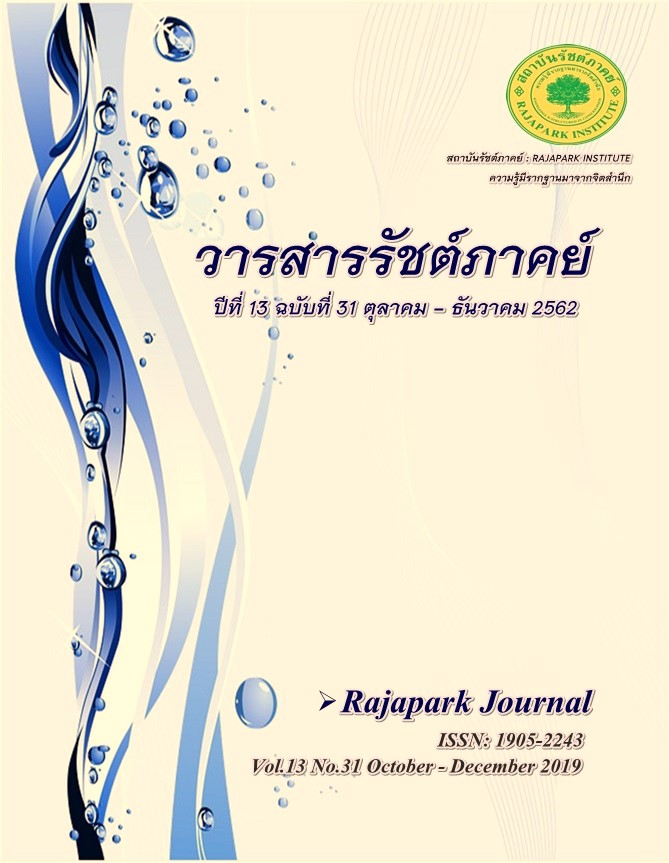The Development of Vocabulary Learning Achievement Using Activity-Based Learning for Prathomsuksa 2 Students of Wat Khian Khet School, Pathum Thani Province
Main Article Content
Abstract
The purposes of the research were to 1) compare Prathomsuksa 2 students’ vocabulary learning achievement before and after using activity-based learning; 2) explore the students’ opinions towards activity-based learning and 3) measure retention of Prathomsuksa 2 students using activity-based learning. The sample, selected by a simple random sampling technique, comprised 42 Prathomsuksa 2/5 students. Research instruments included are 1) lesson plans; 2) an English vocabulary achievement test; and 3) a questionnaire on opinions towards activity-based learning. The data were analyzed by mean of standard deviation and t-test of the One-Sample Test. The results of the study were as follows: 1) the students’ vocabulary learning achievement after studying through activity-based learning was higher than that before students’ studying at the 0.05 level. 2) the students’ opinions toward the activity-based learning were at a high level. 3) the students’ retention after studying towards activity-based learning and after studying 2 weeks later was significantly higher than that of the students’ retention after studying at the 0.05 level.
Article Details
Views and opinions appearing in the Journal it is the responsibility of the author of the article, and does not constitute the view and responsibility of the editorial team.
References
/www/documents/137-abl-activity-based-learning.html
Ayotola, A., & Ishola, A. (2013). Preparation of Primary Teachers in Pupil-Centered Activity- Based
Mathematics Instructions and Its Model. Proceeding In 1st Annual International Interdisciplinary
Conference. Azores, Portugal.
Charoenjai, S. (2007). A Comparative Study on the Effects of Using Visual Art and Total Physical Response Activities Toward the Achievement and Retention Pratomsuksa 3 Students in Learning English Vocabulary. Master Thesis Master of Arts Degree in Teaching English as a Foreign Language Graduate School Srinakharinwirot University.
Chaijaroen, S. (2016). Teaching design, theory, practice principles. Khon Kaen: Penprinting.
Donkaewbua, S. (2015). Linguistics for English teachers. Bangkok: Chulalongkorn University.
Ghadessy, M. (1979). Frequency counts, Word lists, and materials preparation: A new approach. English
Teachings Forum, 17(1), 24-27.
Horsburgh. (1994). Activity-based learning in India. Retrieved June 19, 2018, from https://en.wikipedia.org/ wiki/Activity-based_learning_in_India
Junrat, P. (2005). Educational psychology. Bangkok: Srinakharinwirot University.
Lakshmi R. (2007). Activity based learning. Retrieved June 12, 2018, from https://www.ssa.tn.nic.in/docu/abl-report-by-dr.anandhalakshmi.pdf
Limauksorn, W. (1998). Educational psychology. Bangkok: Faculty of Education Thaksin University.
Limbu, P. (2012). Why do we need to use activity based learning method?. Retrieved June 20, 2018,
from https://eprogressiveportfolio. blogspot.com/2012/06/activity-based-teaching-method.html
Lukkanaadisorn, W. (2007). Brain based Learning. Retrieved June 12, 2018, from https://sites.google.com /site/prapasara/2-12
McGrath, J. R., & MacEwan G. (2011). Linking pedagogical practices of activity-based teaching.
The International Journal of Interdisciplinary Social Sciences, 6, 261-274.
NCSALL. (2006). Activity-based Instruction: Why and How. Retrieved June 12, 2018, from www.ncsall.net/ fileadmin/resources/teach/GED_inst.pdf
Ngamphong, P. (2014). English Core Vocabulary for Thai Students in First, Second and Third Grades. SDU Res. J.
10(1), 239-254.
Padmavathi, B.V.V. (2013). Activity based learning. Research Journal of English Language and Literature
(RJELAL), 1(3), 287-289.
Panthai, B. (2002). Evaluation of subject matter for seminar. Nonthaburi: Sukhothai Thammathirat.
Pruettikul, S. (2012)a. Quality of Students Derived from Active Learning Process. Journal of Educational Administration Burapa University, 6(2), 1-13.
Pruettikul, S. (2012)b. Activity Based Learning. Retrieved June 17, 2018, from https://www.krumontree.com /www/documents/137-abl-activity-based-learning.html
Salkind, J. N. (2010). Encyclopedia of Research Design. America: Sage Publication Asia Pacific. Ltd.
Syoc, V. (1963). Methods of Teaching English as a Foreign Language. Bangkok: The social science association of
Thailand press.
Taylor. (1990). Teaching and learning vocabulary. Cambridge: Great Britain at the University Press.
Thaewanarumitkul, P. (2017). Active Learning Teaching Techniques for Creative Learning. Handout
Training project for teacher development, Thammasat University.
Thawirat, P. (2000). Research methods in behavioral science and social sciences. (7th ed.) Bangkok:
Educational and Psychological Testing Bureau, Srinakharinwirot University.
Tianthong, M. (2013). Statistics and research methods in information technology. Bangkok: King Mongkut's
Institute of Technology.
Toomthong, B. (2012). Research methodology in curriculum and instruction. Bangkok: Laemthong.
Velasco, P. (2010). The Role of Interlexical Homographs in Vocabulary Learning. In Common Core and
ELLs/Emergent Bilinguals: A Guide for All Educators, 1(1), 181-182.
Wilkins, D. A. (1972). Linguistics in Language Teaching. London: Edward Arnold.

